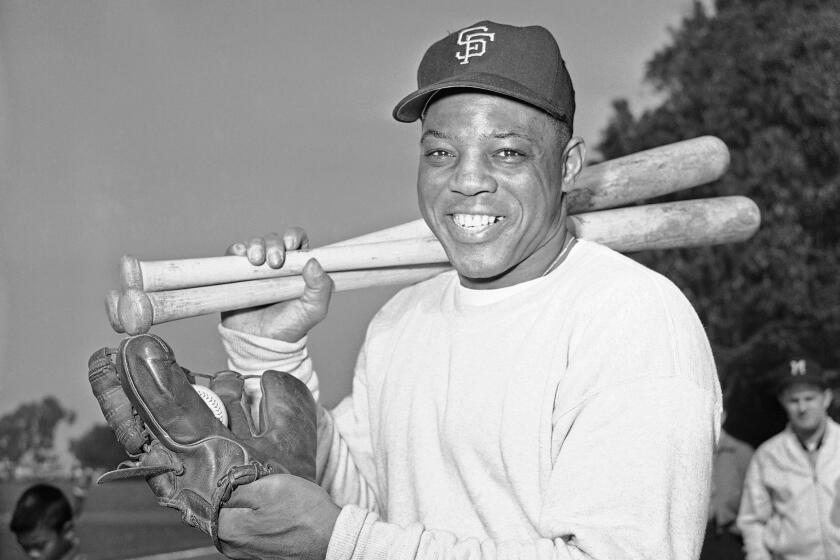Bunny Allen, 95; ‘White Hunter’
He boasted of once killing a charging rhino with a Masai spear, then dropping three more with a rifle in 20 seconds.
He proudly displayed the scar on his forearm where a leopard sank its teeth until an African gun bearer blasted the animal off him.
He talked about his nose, which had been broken by a lion; and his bad hip, the result of a buffalo goring. And, after a few drinks, he’d talk about the romantic liaisons he had while on safari.
Bunny Allen, the last of Africa’s legendary “white hunters,” whose tales of big game kills rivaled stories of his pursuit of beautiful women, died in his sleep in late January at his home on the island of Lamu off the coast of Kenya. He was 95. The exact date and cause of his death were not available.
Allen, who retired to a waterfront Muslim town on the Indian Ocean many years ago, had no shortage of tales from his days as a professional hunter--a career that began in 1927, 50 years before Kenya banned big-game hunting.
Allen, whose part-gypsy father worked for an insurance company, grew up in Berkshire, England, where gypsies taught him to hunt. Born Frank Maurice Allen, he earned his nickname Bunny for his skill in snaring rabbits.
Allen arrived in Africa at 21, hoping to find work as an apprentice to a professional hunter. His first safari was led by Bror Blixen, husband of Karen Blixen, the writer known as Isak Dinesen. (In the film version of Dinesen’s book “Out of Africa,” Bror Blixen was portrayed by Klaus Maria Brandauer and Karen Blixen/Isak Dinesen by Meryl Streep.)
In 1928, Allen was assistant to Denys Finch-Hatton (played by Robert Redford in “Out of Africa”) on a safari with the Prince of Wales. Allen later hunted with Philip Percival, the model for the character Pop in Ernest Hemingway’s “Green Hills of Africa” and organized buffalo hunts for Prince Aly Khan.
During World War II, Allen served as acting regimental sergeant major in the King’s African Rifles and fought the Italians in Somaliland.
After battles, the dead bodies would be picked over by lions. Having been given a taste for human blood, the lions began killing the locals, who asked the soldiers for help.
Taught to track lions by warrior tribesmen he commanded, Allen found and killed two lions sunning themselves after eating a villager.
He later said the Italians sent a note to his regiment, saying: “Please pass on our hearty congratulations to those who got rid of the man-hunters. We can now get on with the war.”
When Hollywood filmmakers came to Africa in the 1950s, it was Allen whose services they enlisted.
He scouted locations for John Huston’s “The African Queen” and worked on “Safari,” “King Solomon’s Mines” and “Where No Vultures Fly.”
And when director John Ford’s cast and crew arrived in southwestern Kenya to make “Mogambo,” Allen organized and supervised a 300-tent camp, as well as 20 white hunters, an unknown number of bearers and more than 1,000 Samburu warriors.
Allen also stood in for the film’s male star, Clark Gable, in dangerous shooting scenes. And he reportedly had an affair with the film’s female star, Ava Gardner, even while Allen’s wife, Murielle, served as wardrobe mistress.
“A beautiful girl, a beautiful character, a beautiful walk,” he once said of the actress, who was married to Frank Sinatra at the time.
“A petty chap,” he said of the famously jealous Sinatra.
For her part, Gardner once said of Allen: “He was the kind of man any girl would trust to lead her into the jungle.”Tall, with wavy dark hair and an aquiline nose, the sun-bronzed Allen never disputed his reputation as a lady’s man.
“A hunter’s life is primitive stuff, and not just during the day,” he once explained. “It’s intimate, and things happen. Emotions are stirred, which spill over into the evening; affairs are inevitable.”
Of the various animals he hunted, Allen told the New York Times in 1989, he had “a great admiration for the buffalo, a magnificently strong, brave and pretty formidable opponent. I had no compunction at shooting a buffalo. Most other animals I always had a slight feeling of remorse.”
Allen’s son, David, now a gamekeeper, once saved his father’s life when a buffalo charged him.
Allen’s gun bearer had mistakenly handed him a rifle without ammunition just as a buffalo was headed toward him. Allen avoided the animal’s horns by swinging himself on top of the buffalo’s head and was carried along until his son shot the buffalo.
“All the soft parts of the buffalo fell on me,” Allen recalled. “I got away with a few broken ribs.”
In his later years, Allen expressed contempt for modern-day poachers, particularly those who killed elephants by the thousands.
“The older I’ve got, the more I’ve hated killing anything, including snakes,” he said. “I think they all have a job in life.”
Allen, who wrote three volumes of memoirs, was the subject of a 1996 documentary, “A Gypsy Life.”
In addition to his son David, Allen is survived by his third wife, Jeri; and two other children from his first marriage, Lavinia and Anton; and six grandchildren.
